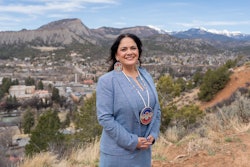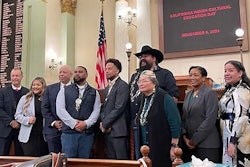WINDOW ROCK, Ariz.
Needs across Indian Country include jails, schools, infrastructure and water. On the Navajo Nation, those needs surface on a much larger scale than elsewhere, a U.S. Bureau of Indian Affairs official says.
“These are the needs we need to address,” Carl Artman, assistant secretary for the BIA told council delegates on the first day of their summer session. “We want to work with you on a resolution to these issues.”
Among the more pressing needs is education, Artman said. The BIA operates 184 elementary and secondary schools on tribal lands; 66 of those are on the Navajo Nation seven of which have met annual yearly progress.
“We’re not failing ourselves,” Artman said Monday. “We’re failing our students.”
The Navajo Nation has been working on its own set of educational standards that would incorporate culture and tradition. Delegate Ervin Keeswood called on Artman to support the tribe’s plans.
“Please have a heart for whatever we will provide to you,” Keeswood said.
Artman, a member of the Oneida Nation of Wisconsin, introduced himself to delegates in a traditional way first by naming his tribe, then his clan.
More than a dozen of the 88 delegates took the opportunity to question Artman on everything from trust issues to his decision not to support legislation on a water rights settlement involving the tribe and a formula that determines how tribes are funded.
“It’s always good to be reminded of what we need to do,” Artman said. “Oftentimes we lose sight of the issues that aren’t on the national radar.”
As for the San Juan River settlement, the Interior Department has said it needs more time to study the deal, which would cost the federal government $1 billion over 15 to 20 years.
One of the common refrains in the BIA when dealing with Navajo issues is “Wow, that’s a lot of money,” Artman said.
Navajo President Joe Shirley Jr. said in his address to the council Monday that many Navajos who haul water would be affected by the settlement.
“Although construction of the project will not eliminate all water hauling on our land, this project will deliver water to tens of thousands of people who don’t have it now,” he said.
Shirley has said $600 million will meet the needs of his tribe the county’s largest, spanning 27,000 square miles and has asked federal officials to loan the tribe the money.
But Artman said it would be tough to simply issue the tribe a check for that amount.
“But perhaps by combining a number of different financing tools, we may be able to come up with a package or at least help the Navajo Nation come up with a package,” he said.
Most roads on the Navajo Nation are unpaved, unemployment hovers around 50 percent and the tribe struggles to house inmates.
“The Navajo Nation has expressed a desire to right itself and determine its own direction,” Artman said. “In order to do so, a lot of these needs have to be dealt with first.”
Economic development is not possible without good schools, adequate law enforcement, courts or roads, Artman said. Likewise, he said a good educational system cannot be achieved without economic development.
“In order to get ahead of the game, I think the Navajo Nation is simply saying it needs to break that cycle,” he said.
Navajo leaders have called on the BIA to help with the unmet needs of the tribe.
“We are facing a lot of challenges, and one of them is a lack of resources, especially from the trustee for all of the tribes,” said Delegate Amos Johnson.
Artman said he has asked the bureau’s economic office to look into whether the tribe could be issued loans, grants or loan guarantees.
“Obviously any solution that large is going to have to be done in conjunction with one another,” he said.
Artman pointed to two initiatives launched last year by Interior Secretary Dirk Kempthorne that he said would aid tribes in filling law enforcement vacancies, addressing public safety and judicial needs and improving Indian education.
“We have a priority list,” he said. “But the hardest part is getting through that.”
–Associated Press
© Copyright 2005 by DiverseEducation.com


















